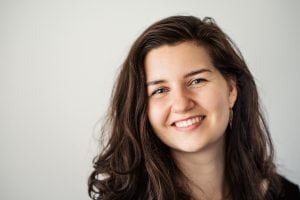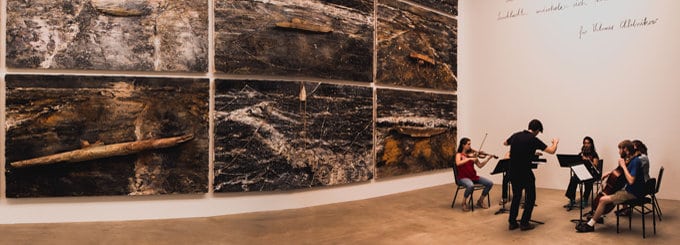By Cara Search, Special to the Sybaritic Singer
“Bop,” “jam,” and “banger,” are the most coveted monikers of good music making at Bang on a Can’s summer festival at the Massachusetts Museum of Contemporary Art (MASS MoCA). Situated in the Berkshires just an hour’s drive north of the Tanglewood Music Center and affectionately called Banglewood by its participants (called “fellows”), the festival is the annual site of raucous and unpretentious music making in the style of the 30-year-old experimental music powerhouse that conceived of it.
I attended this year’s festival (July 9-29, 2018) as a mezzo-soprano keen on jumpstarting relationships with New York-based musicians, and kicking my new music training into high gear for a few weeks. I’d spent the previous year slowly but surely scratching the surface of a freelance career in New York, and couldn’t wait to be thrown into the nonstop creative work of a festival as jam-packed as Bang on a Can.
I did not anticipate the seismic personal changes it would inspire. I’m delighted to report that, as a consequence of Banglewood, I am a full-on joiner. I’m headbanging to Julia Wolfe* and no longer (as) afraid of the words “jam session.” I’m keeping in contact via memes and new music open mics with my Banglefam(ily) and taking steps to involve myself as an administrator in NYC music- and art-commissioning organizations. Most significantly, I’m moving through the uncertainties of freelance music-making with the grounding belief that there is an audience hungry for the music I make. There is a community that wants to play it, discover it, keep people talking about it, and create it out of thin air as much as I do.
I felt the novelty of this collectively energized experimentation most often in the daily lunch recitals. Composers and performers present 10 minutes of their own work set thoughtfully in one of MASS MoCA’s vast gallery spaces to create these 30-minute recitals. The effect is of introducing yourself musically by sharing with new friends and a sometimes unsuspecting audience a performance as candid and personal as a live musical selfie.
Candidness was a hallmark of the entire festival, and allowed me to lean into my own artistic identity as more omnivorous than the beautiful, but specific, algorithmic virtuosity that I’d first gotten my feet wet with in Montreal. I got a chance to let go of conceptions of “new music” that were constricting my artistry, and limiting what I valued as fresh and exciting in art-making.
Along those lines, another major strength of this festival is its insistence on meaningful musical experiences away from scores and away from participants’ primary instrument. At least one hour a day is devoted to hands-on workshops in African drumming and dance (led by Nani Agbeli, CalArts’ Director of West African Music, Dance and Arts (Ghana)), sonic meditation, improvisation, and rapid composition (with Found Sound Nation), or the Orchestra of Original Instruments with BOAC All-Star guitarist Mark Stewart, where fellows produce and play surprisingly agile instruments made out of vacuum tubes, balloons, PVC pipes, and the like.
These DIY, beginner’s-mind vibes came within the framework of the festival’s 17-year tenure at MASS MoCA, and the undeniable institutional clout of the 30-year-old Bang on a Can organization itself.
Steve Reich was this year’s Guest Composer in attendance, and three of his works (Radio Rewrite, Sextet, and Runner) formed pillars of the festival’s closing six-hour marathon, around which works by the Bang on a Can founders, David Lang, Julia Wolfe, and Michael Gordon, were programmed, along with works by Ligeti, Xenakis, Jonathan Bailey Holland, and more. Pamela Z was in attendance for rehearsals, and Missy Mazzoli came to the marathon.
Usually if you are interested in contemporary music, you’re the oddball in your music school, so we had this idea from the beginning that it would be great for our world if those people could find each other in a school situation like this.
In an interview at this year’s festival, David Lang, one of the three co-founders of Bang on a Can, said about the beginning of the summer festival in 2002, “Usually if you are interested in contemporary music, you’re the oddball in your music school, so we had this idea from the beginning that it would be great for our world if those people could find each other in a school situation like this.”
To that end, rehearsals for the aforementioned pieces were in keeping with the conservatory model. Many of the fourteen marathon ensembles were conducted by Brad Lubman, Founding Co-Artistic and Musical Director of the NY-based Ensemble Signal, and all of the others were staffed with at least one faculty member to guide rehearsals.
Also like school, fellows’ daily schedules were managed from 9 am to around 9 pm every weekday (and some weekends). This was a thrill for me, whose happiest art-making happens in the papoose of a tight school-to-cool squeeze.
Speaking of the squeeze, there are about a thousand and one activities and initiatives of the Bang on a Can festival (and beautiful MASS MoCA!) that are outside the scope of this article. They’re well-documented on the Bang on a Can summer festival website. If you do choose to attend the festival, look forward to some musical Easter eggs that won’t appear in your application materials: a Kids’ Show curated by Program Manager Philippa Thompson, live Latin music night at the local American Legion bar, Mark Stewart’s “Covers Night” at MASS MoCA’s starlit outdoor bar where faculty and fellows gleefully show their pop, soul, jazz, and (if you’re lucky) rap chops, and so much more.
Transactionally put, attending the Bang on a Can Summer Festival is one of the best personal and professional investments I have made to date**. Fully actualized and proposed collaborations have come out of it already (stay tuned for a trans-Atlantic tour of a new opera by a fellow composer), and I expect to create and participate in even more.
More consequential, my experiences and conversations with new friends and colleagues at Bang on a Can shifted my professional and artistic goals towards experimentation, joy, and inclusivity in contemporary art and art music (and dare I say life?) above virtuosic excellence, gig-getting, or hustling for status.
I’ll close it out here at the risk of burrowing myself deeper into cliché. I feel a lot of love for Bang on a Can, and hope lots more people get to feel it too. That’s all!
*Not that I didn’t before — I just have company now.
**The tuition is undeniably steep. Festival leadership is engaged in an active project to eliminate it entirely; in the meantime, work study arrangements are available upon request (I took advantage of it!), and many fellows were assisted by grants from their home states/countries, and from their academic programs.
 Mezzo-soprano Cara Search sings, improvises, composes game music, and creates interdisciplinary theater in New York City. This past season (2017-18), Cara sang with Fresh Squeezed Opera Company, Anonymous Ensemble, Utopia Opera, and members of Bang on a Can All-Stars, International Contemporary Ensemble, and Sō Percussion. Her favorite painter is Janet Werner, favorite podcast is Still Processing, and her favorite lie is that she doesn’t care about astrology. Cara holds a B.Mus from McGill University in Montreal. www.carasearch.com
Mezzo-soprano Cara Search sings, improvises, composes game music, and creates interdisciplinary theater in New York City. This past season (2017-18), Cara sang with Fresh Squeezed Opera Company, Anonymous Ensemble, Utopia Opera, and members of Bang on a Can All-Stars, International Contemporary Ensemble, and Sō Percussion. Her favorite painter is Janet Werner, favorite podcast is Still Processing, and her favorite lie is that she doesn’t care about astrology. Cara holds a B.Mus from McGill University in Montreal. www.carasearch.com

